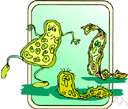anaerobe
Also found in: Thesaurus, Medical, Encyclopedia.
an·aer·obe
(ăn′ə-rōb′, ăn-âr′ōb′)n.
An organism, such as a bacterium, that can live in the absence of free oxygen.
American Heritage® Dictionary of the English Language, Fifth Edition. Copyright © 2016 by Houghton Mifflin Harcourt Publishing Company. Published by Houghton Mifflin Harcourt Publishing Company. All rights reserved.
anaerobe
(æˈnɛərəʊb; ˈænərəʊb) oranaerobium
n, pl -obes or -obia (-ˈəʊbɪə)
(Biology) an organism that does not require oxygen for respiration. Compare aerobe
Collins English Dictionary – Complete and Unabridged, 12th Edition 2014 © HarperCollins Publishers 1991, 1994, 1998, 2000, 2003, 2006, 2007, 2009, 2011, 2014
an•aer•obe
(ˈæn əˌroʊb, ænˈɛər oʊb)n.
an organism, esp. a bacterium, that does not require air or free oxygen to live (opposed to aerobe).
[1875–80]
Random House Kernerman Webster's College Dictionary, © 2010 K Dictionaries Ltd. Copyright 2005, 1997, 1991 by Random House, Inc. All rights reserved.
ThesaurusAntonymsRelated WordsSynonymsLegend:
Switch to new thesaurus
| Noun | 1. |  anaerobe - an organism (especially a bacterium) that does not require air or free oxygen to live anaerobe - an organism (especially a bacterium) that does not require air or free oxygen to liveorganism, being - a living thing that has (or can develop) the ability to act or function independently obligate anaerobe - an organism that cannot grow in the presence of oxygen |
Based on WordNet 3.0, Farlex clipart collection. © 2003-2012 Princeton University, Farlex Inc.
Translations
Collins Italian Dictionary 1st Edition © HarperCollins Publishers 1995
an·aer·obe
n. anaerobio, microorganismo que se multiplica en ausencia de aire u oxígeno.
English-Spanish Medical Dictionary © Farlex 2012